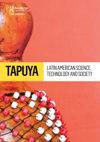Interactive experiences in social science research in Mexico: networking and knowledge mobilization
IF 1.2
Q2 HISTORY & PHILOSOPHY OF SCIENCE
Tapuya: Latin American Science, Technology and Society
Pub Date : 2023-09-11
DOI:10.1080/25729861.2023.2216100
引用次数: 0
Abstract
In the social sciences, a direct relationship with societal actors is an extended practice of conducting research, particularly in fields entailing in-depth empirical fieldwork. This paper analyzes the interactive processes observed in knowledge production in social sciences. The aim is to understand how these relationships are constructed between academic and non-academic actors, which is the goal of researchers in approaching social actors in this way, and the scope of these relationships for generating knowledge and addressing societal problems.Given the modalities of social science research, two frameworks are essential to analyzing these processes. On the one hand, there is the notion of knowledge networks. On the other, knowledge mobilization concerns understanding these processes and their linearity or non-linearity. In this paper, integrating both frameworks helps explain interactive social research.Based on recent empirical information about social sciences research in Mexico, this paper analyzes the dimensions of the interactive character of knowledge generation in these disciplines. The purpose of the paper is to document how the interactions between academic and non-academic actors are built during research; the characteristics of such collaborations; how the mobilization of knowledge occurs emphasizing learning processes and trust generation.墨西哥社会科学研究中的互动经验:网络与知识动员
在社会科学中,与社会行为者的直接关系是开展研究的延伸实践,特别是在需要深入实证实地考察的领域。本文分析了社会科学知识生产中观察到的互动过程。目的是了解这些关系是如何在学术和非学术行为者之间构建的,这是研究人员以这种方式接近社会行为者的目标,以及这些关系在产生知识和解决社会问题方面的范围。鉴于社会科学研究的模式,两个框架对于分析这些过程是必不可少的。一方面,有知识网络的概念。另一方面,知识动员涉及理解这些过程及其线性或非线性。在本文中,整合这两个框架有助于解释互动社会研究。基于墨西哥社会科学研究的最新实证信息,本文分析了这些学科知识生成的互动特征的维度。本文的目的是记录学术和非学术行为者之间的互动是如何在研究过程中建立的;这种合作的特点;如何调动知识发生强调学习过程和信任的产生。
本文章由计算机程序翻译,如有差异,请以英文原文为准。
求助全文
约1分钟内获得全文
求助全文
来源期刊

Tapuya: Latin American Science, Technology and Society
Social Sciences-Social Sciences (all)
CiteScore
1.60
自引率
0.00%
发文量
39
审稿时长
19 weeks
 求助内容:
求助内容: 应助结果提醒方式:
应助结果提醒方式:


